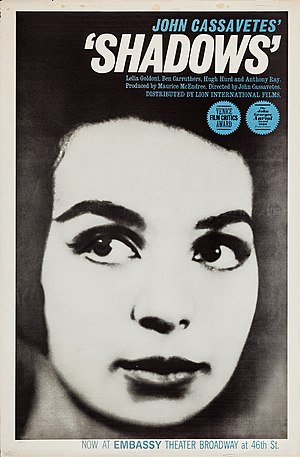Shadows (1959 film)
| This article was copied (instead of imported) from the now-deleted Miraheze wikis. |
"A breath of fresh air that changed independent filmmaking forever, John Cassavetes’s monumental debut rebels against Hollywood’s formulas and commercial imperatives. Grooving to the jazzy swing of downtown New York, Shadows also tackles the racial intolerance that undercuts the chic social scene."
— MUBI's take
| Shadows (1959 film) | ||||||||||||||||||||||
|---|---|---|---|---|---|---|---|---|---|---|---|---|---|---|---|---|---|---|---|---|---|---|
This film has been preserved in the National Film Registry in 1993.
| ||||||||||||||||||||||
 | ||||||||||||||||||||||
|
Shadows is a 1959 American independent drama film directed by John Cassavetes about race relations during the Beat Generation years in New York City. The film stars Ben Carruthers, Lelia Goldoni, and Hugh Hurd as three mulatto siblings, though only one of them is dark-skinned enough to be considered African American. The film was initially shot in 1957 and shown in 1958, but a poor reception prompted Cassavetes to rework it in 1959. Promoted as a completely improvisational film, it was intensively rehearsed in 1957, and in 1959 it was fully scripted.
Why It Rocks
- A major innovative aspect of both versions is the “distributed” nature of the narratives. The various characters live different lives and act out independent destinies, presented in separate scenes and sets of relationships. In fact, Hugh, Ben, and Lelia’s stories were kept so separate for the first 45 minutes that most viewers didn't even know they were siblings. Aside from jumping from one storyline to another, a universe was created that allowed for genuinely different points of view and different emotional and moral relationships to experience. The tone and mood constantly being changed allows the viewer to have more than one emotional relationship to experiences even within a single scene.
- A rather interesting premise where Hugh, Ben and Lelia are all the children of black parents (and yet only Hugh is dark enough of pass off as a full black, whereas Ben and Leila are mixed raced more than anything), and Ray -- Leila's boyfriend -- finds out about her mixed race for the first time. There are multiple different ways to play this scenario out, and yet the end results work out.
- Memorable soundtrack with music from none other than Charles Mingus, despite their being less than 3 minutes worth.
- Another innovative aspect is that characters’ identities are relational. The process of collaborating with others to create your own identity is a recurring theme for Cassavetes and his characters. Personal identity isn't predetermined, rather it's brought into existence in performance. One's identity is a capacity—something that's costantly composed and decomposed. It's a major theme for this film, which happens to be Cassavetes' directorial debut. The characters are only “shadows” of themselves until they bring themselves into existence in more substantial and meaningful ways.
- The lead characters are given significant attention towards their emotional and imaginative problems. They're all flawed, foolish, or both, which not even the semi-comedy can take away from. In fact, The plot is pretty much how the characters need recognize and leave behind the false, fictional roles in which they have cast themselves in order to discover their true needs and desires. Everyone tries to act cool and/or professional when really, it was unhealthy for everyone in the long run and their relationships with others.
- In the final fifteen minutes, the characters are all forced into a state of breakdown to reveal the fallacy of their imaginative stances, in order to experience a possible breakthrough about who they really are as opposed to who they think they are or who they want to be.
- Hugh and Rupert realize that their friendship is more important than their jobs and professional identities
- Ben realizes that his coolness and cruising are not emotionally satisfying
- Tony realizes that the wall between himself and Lelia is of his own creation
- and Lelia realizes that her attempt to appear sophisticated and knowing betrays her real feelings.
Bad Qualities
- There are a number of scenes that don't work whether to due to opaque directing or the actors' limited skills. For example, there's a fight between Hugh and Tony that's bristling with emotions that feel honest and earned, but the script lets them down with the director unable to resolve something that doesn't quite make sense and but unable to move forward unless the conflict takes place.
- The film is definitely not going to appeal to everyone, especially considering that the film was more interested in making it's characters interesting, than creating a compelling storyline for said characters. The storylines are all over the place and incohesive.